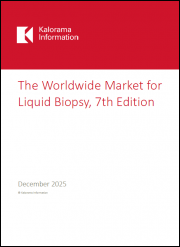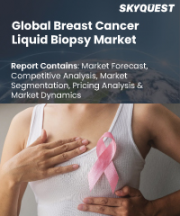
|
시장보고서
상품코드
1722450
액체생검 시장 보고서 : 제품 및 서비스, 순환 바이오마커, 암 유형, 최종사용자, 지역별(2025-2033년)Liquid Biopsy Market Report by Product And Service, Circulating Biomarker, Cancer Type, End User, and Region 2025-2033 |
||||||
세계 액체생검 시장 규모는 2024년 23억 달러에 달했습니다. 향후 IMARC Group은 이 시장이 2033년까지 72억 달러에 달하고, 2025-2033년 12.82%의 연평균 성장률(CAGR)을 보일 것으로 전망하고 있습니다. 암 발병률 증가, 개인 맞춤형 의료 및 치료에 대한 수요 증가, 액체생검 자동화 플랫폼 시장 개척 등이 시장 성장을 가속하는 주요 요인으로 꼽힙니다.
액체생검 시장 분석 :
주요 시장 성장 촉진요인 : 차세대 시퀀싱 도입에 따른 라이프스타일의 변화, 특히 직장인의 암 발병률 증가가 시장 성장을 가속하고 있습니다. 액체생검은 혈액, 소변 등 체액에서 순환종양세포(CTC), 무세포 DNA(cfDNA), 엑솜 등 암 관련 바이오마커를 검출할 수 있습니다. 조기 발견은 효과적인 치료와 환자 예후 개선에 필수적이며, 시장 성장의 원동력이 되고 있습니다.
주요 시장 동향 : 기술 발전, 임상 적용 확대, 다중 분석 접근 방식으로의 전환, 조기 발견 및 스크리닝에 대한 관심 증가, 임상시험에서 액체 생검의 채택 증가 등은 향후 몇 년 동안 시장 성장을 가속할 것으로 예상되는 주요 요인 중 일부입니다. 또한, 시퀀싱 기술, 마이크로플루이딕스공학, 바이오인포매틱스 분야의 지속적인 혁신은 액체생검 분석의 민감도, 특이성, 확장성을 향상시켜 액체생검 시장의 수익을 더욱 강화시키고 있습니다.
지역별 현황: 보고서에 따르면 북미가 가장 큰 시장 점유율을 차지하고 있습니다. 북미에서 암은 여전히 큰 건강 문제이며, 인구의 상당수가 매년 다양한 유형의 암 진단을 받고 있습니다. 높은 발병률로 인해 비침습적이고 정확한 암 감지 및 모니터링 방법을 제공하는 액체 생검과 같은 혁신적인 진단 도구에 대한 수요가 증가하고 있습니다. 이는 액체 생검 시장 수요에 긍정적인 영향을 미치고 있습니다.
경쟁 구도: 액체 생검 시장의 주요 기업으로는 ANGLE plc, Biocept Inc. AG,Guardant Health Inc.,Illumina Inc.,MDxHealth SA,Menarini Silicon Biosystems,QIAGEN N.V.,Thermo Fisher Scientific Inc. 등이 있습니다.
과제와 기회: 분석 표준화 및 검증, 임상적 검증 및 근거 마련, 비용 검토 및 상환은 현재 시장이 직면하고 있는 주요 과제 중 일부입니다. 그러나 액체생검은 인공지능(AI) 및 머신러닝과 같은 디지털 헬스 기술과 통합하여 데이터 분석, 해석 및 임상적 의사결정을 강화할 수 있습니다. 이는 제조업체에게 중요한 기회입니다.
액체생검 시장 동향 :
암 유병률 증가
암 발병률은 전 세계적으로 증가 추세에 있으며, 조기 발견과 모니터링에 대한 중요성이 강조되고 있습니다. 예를 들어, 세계보건기구(WHO)에 따르면 2022년에는 2,000만 명이 새롭게 암 진단을 받고 970만 명이 사망할 것으로 예측됩니다. 또한 암 진단을 받은 후 5년 후 생존해 있는 사람의 수는 5,350만 명으로 예상되고 있습니다. 암은 일생 동안 약 5명 중 1명꼴로 발병하며, 2050년에는 3,500만 명 이상의 암 환자가 증가할 것으로 예상되며, 이는 2022년 추정치인 2,000만 명보다 77% 증가한 수치입니다. 액체생검은 혈액이나 소변과 같은 체액에서 순환종양세포(CTC), 무세포 DNA(cfDNA)와 같은 순환종양 바이오마커를 검출하는 비침습적 방법입니다. 이러한 바이오마커는 암의 존재, 진행 및 유전적 프로파일에 대한 귀중한 통찰력을 제공하여 임상의가 암을 조기에 진단하고 질병의 진행을 보다 효과적으로 모니터링할 수 있도록 돕습니다. 예를 들어, 2023년 미국암학회 연례회의에서 연구진은 혁신적인 플랫폼을 사용하여 DNA 메틸화를 분석하는 다중 암 조기 발견 검사에 대한 조사 보고서를 발표했습니다. 기존 검사에서는 염기서열을 결정하기 전에 DNA를 화학적으로 처리해야 했지만, 이 새로운 접근법은 화학적, 효소적 치료 없이도 메틸화된 cfDNA 분자를 포착할 수 있습니다. 최근 치료 경험이 없는 암 환자와 나이와 성별이 일치하는 대조군을 포함한 약 4,000명의 샘플을 대상으로 후향적 분석을 통해 이 플랫폼이 12가지 암을 검출하는 능력을 검증했습니다. 암 사례의 약 절반은 초기 단계였습니다. 또한 2020년에는 펜실베니아 대학교 연구팀이 Clinical Cancer Research 저널에 액체생검이 초기 췌장암 진단에서 92%의 정확도를 보였습니다는 논문을 발표하기도 했습니다. 이러한 요인들은 액체생검 시장 예측에 더욱 긍정적인 영향을 미치고 있습니다.
비침습적 산전검사(NIPT)에 대한 수요 증가
양수 천자나 융모막 융모막 채취(CVS)와 같은 전통적인 산전 검사 방법에는 유산을 포함한 합병증 위험이 적지 않은데, NIPT는 산모의 혈액을 순환하는 무세포 태아 DNA(cffDNA)를 분석하여 산전 검사에 대한 비침습적 대안을 제시합니다. 예를 들어, 국립의학도서관에 따르면 양수 천자는 임신 15주부터 출산까지 어디에서나 시행할 수 있으며, 전문가의 손에 의한 단태아 손실 확률은 0.13%라고 합니다. 이에 따라 임신 15주 이후에 양수 천자를 받을 위험은 100명 중 1명꼴로 추정됩니다. 이 비침습적 접근법은 안전성과 시술 관련 합병증 위험 감소로 인해 많은 임산부 부모들이 선호하고 있습니다. 또한, NIPT는 21번 삼염색체증(다운증후군), 18번 삼염색체증(에드워즈 증후군), 13번 삼염색체증(파타우 증후군)과 같은 흔한 태아 염색체 이상을 높은 정확도로 검출할 수 있는 것으로 입증되었습니다. 또한, 액체 생검에 기반한 NIPT 분석은 태아의 유전자 이상을 높은 민감도와 특이도로 검출할 수 있어 임산부 부모에게 아기의 건강 상태에 대한 신뢰할 수 있는 정보를 제공할 수 있습니다. 예를 들어, 2023년 11월 Novacyt의 자회사인 Yourgene Health는 Laboriad와 협력하여 모로코 최초의 비침습적 산전검사(NIPT) 플랫폼을 도입했습니다. NIPT는 임신 9-10주라는 이른 시기에 시행할 수 있어 태아의 유전적 건강을 조기에 파악할 수 있습니다. 염색체 이상을 조기에 발견함으로써 임산부 부모는 임신에 대한 정보에 입각한 결정을 내릴 수 있고, 추가 진단 검사나 특별한 도움이 필요한 아이의 출산 준비를 고려할 수 있습니다. 또한, NIPT는 임신 9-10주라는 이른 시기에 시행할 수 있어 태아의 유전적 건강을 조기에 파악할 수 있습니다. 염색체 이상을 조기에 발견함으로써 임산부 부모는 임신에 대한 정보에 입각한 결정을 내릴 수 있고, 추가 진단 검사나 특별한 도움이 필요한 아이에 대한 출산 준비를 고려할 수 있습니다. 예를 들어, 클리블랜드 클리닉이 발표한 기사에 따르면, NIPT 검사는 빠르면 임신 10주부터 출산까지 시행할 수 있습니다. 이러한 요인들은 최근 액체 생검 시장의 가격에 더욱 긍정적인 영향을 미치고 있습니다.
R&D 활동 및 임상시험 증가
액체생검의 기술 발전으로 암 검진, 임상시험의 최적화, 치료법 선택의 빈도가 높아지고 있습니다. 다양한 정부 기관과 기업들은 액체생검에 대한 임상 연구를 수행하기 위해 R&D 투자에 집중하고 있습니다. 예를 들어, 2023년 6월 Anzu Partners는 Codetta Biosciences에 대한 1,500만 달러 규모의 시리즈 A 투자 라운드를 주도했습니다. 제노바벤처스(Genova Ventures)와 VC23 LLC도 이 자금 조달에 기여했습니다. 이번 자금 조달을 통해 코데타는 R&D, 엔지니어링, 마케팅, 경영관리 등의 팀을 빠르게 확장하고 액체 생검을 위한 멀티오믹스 dsPCR 플랫폼 개발을 가속화할 계획입니다. 또한, 임상시험은 새로운 액체생검 기술과 플랫폼의 성능을 평가하기 위한 플랫폼 역할을 할 것입니다. 연구개발에 대한 투자를 통해 차세대 시퀀싱(NGS) 플랫폼, 디지털 PCR 시스템, 기타 액체생검 분석의 민감도, 특이성, 확장성을 향상시키는 혁신적인 기술을 개발할 수 있습니다. 임상시험은 이러한 진보를 실제 임상 현장에서 검증할 수 있는 기회를 제공하고, 상업화 및 보급의 길을 열어줍니다. 예를 들어, 2024년 4월, 유전자 치료제 제조의 격차를 해소하는 데 초점을 맞춘 혁신 기업인 NewBiologix SA는 바이오 제약 산업에 종합적인 유전체 분석 서비스를 제공하는 새로운 기술군인 차세대 염기서열 분석(NGS) 및 광매핑 플랫폼을 발표했습니다. 발표하였습니다. 이러한 요인들이 액체 생검 시장 점유율을 더욱 높이고 있습니다.
목차
제1장 서문
제2장 조사 범위와 조사 방법
- 조사 목적
- 이해관계자
- 데이터 소스
- 1차 정보
- 2차 정보
- 시장 추정
- 보텀업 접근
- 톱다운 접근
- 조사 방법
제3장 주요 요약
제4장 서론
- 개요
- 주요 업계 동향
제5장 세계의 액체생검 시장
- 시장 개요
- 시장 실적
- COVID-19의 영향
- 시장 예측
제6장 시장 분석 : 제품 및 서비스별
- 키트 및 시약
- 플랫폼 및 기기
- 서비스
제7장 시장 분석 : 순환 바이오마커별
- 순환종양 세포
- 세포외 소포
- 순환종양 DNA
- 기타
제8장 시장 분석 : 암 유형별
- 폐암
- 유방암
- 대장암
- 전립선암
- 간암
- 기타
제9장 시장 분석 : 최종사용자별
- 병원 및 연구소
- 학술 연구센터
- 기타
제10장 시장 분석 : 지역별
- 북미
- 미국
- 캐나다
- 아시아태평양
- 중국
- 일본
- 인도
- 한국
- 호주
- 인도네시아
- 기타
- 유럽
- 독일
- 프랑스
- 영국
- 이탈리아
- 스페인
- 러시아
- 기타
- 라틴아메리카
- 브라질
- 멕시코
- 기타
- 중동 및 아프리카
- 시장 내역 : 국가별
제11장 SWOT 분석
- 개요
- 강점
- 약점
- 기회
- 위협
제12장 밸류체인 분석
제13장 Porter의 Five Forces 분석
- 개요
- 바이어의 교섭력
- 공급 기업의 교섭력
- 경쟁 정도
- 신규 진출업체의 위협
- 대체품의 위협
제14장 가격 분석
제15장 경쟁 구도
- 시장 구조
- 주요 기업
- 주요 기업 개요
- ANGLE plc
- Biocept Inc.
- Bio-Rad Laboratories Inc
- Epigenomics AG
- Exact Sciences Corporation
- F. Hoffmann-La Roche AG
- Guardant Health Inc.
- Illumina Inc.
- MDxHealth SA
- Menarini Silicon Biosystems
- QIAGEN N.V.
- Thermo Fisher Scientific Inc.
The global liquid biopsy market size reached USD 2.3 Billion in 2024. Looking forward, IMARC Group expects the market to reach USD 7.2 Billion by 2033, exhibiting a growth rate (CAGR) of 12.82% during 2025-2033. The increasing prevalence of cancer, the rising demand for personalized medicine and treatments, and the development of automated liquid biopsy platforms, represent some of the key factors driving the market growth.
Liquid Biopsy Market Analysis:
Major Market Drivers: The rising prevalence of cancer owing to changing lifestyle patterns, especially among working professionals, along with the introduction of next-generation sequencing is propelling the market growth. Liquid biopsies enable the detection of cancer-related biomarkers, such as circulating tumor cells (CTCs), cell-free DNA (cfDNA), and exosomes, in bodily fluids like blood or urine. Early detection is crucial for effective treatment and improved patient outcomes, thereby driving the market growth.
Key Market Trends: Technological advancements, expanding clinical applications, a shift towards multi-analyte approaches, rising focus on early detection and screening, and elevating adoption of liquid biopsies in clinical trials are some of the key factors that are expected to stimulate the market growth in the coming years. Moreover, continuous innovation in sequencing technologies, microfluidics, and bioinformatics is enhancing the sensitivity, specificity, and scalability of liquid biopsy assays, thereby further bolstering the liquid biopsy market revenue.
Geographical Landscape: According to the report, North America accounted for the largest market share. Cancer remains a major health concern in North America, with a significant portion of the population being diagnosed with various types of cancer each year. The high incidence rates drive the demand for innovative diagnostic tools like liquid biopsies that offer non-invasive and accurate methods for cancer detection and monitoring. This is further positively impacting the liquid biopsy market demand.
Competitive Landscape: Some of the leading liquid biopsy market companies are ANGLE plc, Biocept Inc., Bio-Rad Laboratories Inc, Epigenomics AG, Exact Sciences Corporation, F. Hoffmann-La Roche AG, Guardant Health Inc., Illumina Inc., MDxHealth SA, Menarini Silicon Biosystems, QIAGEN N.V., and Thermo Fisher Scientific Inc., among many others.
Challenges and Opportunities: Standardization and validation of assays, clinical validation and evidence generation, and cost consideration and reimbursement are some of the key challenges that the market is currently facing. However, liquid biopsies can be integrated with digital health technologies, such as artificial intelligence (AI) and machine learning, to enhance data analysis, interpretation, and clinical decision-making. This represents key opportunities for the manufacturers.
Liquid Biopsy Market Trends:
Rising Prevalence of Cancer
With cancer rates on the rise globally, there's a growing emphasis on early detection and monitoring of the disease. For instance, according to WHO, in 2022, there were expected to be 20 million new cancer diagnoses and 9.7 million fatalities. The expected number of people who survived five years after a cancer diagnosis was 53.5 million. Cancer affects around one in every five persons in their lifetime. Over 35 million more cancer cases are expected in 2050, up 77% over the estimated 20 million in 2022. Liquid biopsies offer a non-invasive method to detect circulating tumor biomarkers, such as circulating tumor cells (CTCs) and cell-free DNA (cfDNA), in bodily fluids like blood or urine. These biomarkers can provide valuable insights into the presence, progression, and genetic profile of cancer, enabling clinicians to diagnose cancer at earlier stages and monitor disease progression more effectively. For instance, at the 2023 American Association of Cancer Research Annual Meeting, researchers presented a report on a liquid biopsy multicancer early detection test that analyzes DNA methylation using an innovative platform. While conventional tests need chemical treatment of DNA before sequencing, the novel approach captures methylated cfDNA molecules without any chemical or enzymatic treatment. The scientists conducted a retrospective analysis to examine the ability of the platform to detect 12 cancer types in a sample of around 4,000 people, including recently diagnosed, treatment-naive cancer patients, and age- and gender-matched controls. Approximately half of the cancer cases were in the early stages. In addition, in 2020, a team of researchers from the University of Pennsylvania released a paper in Clinical Cancer Research demonstrating that their liquid biopsy was 92% accurate in diagnosing early pancreatic cancer. These factors are further positively impacting the liquid biopsy market forecast.
Rising Demand for Non-Invasive Pre-Natal Tests (NIPT)
Traditional prenatal testing methods, such as amniocentesis and chorionic villus sampling (CVS), carry a small risk of complications, including miscarriage. NIPT, which involves analyzing cell-free fetal DNA (cffDNA) circulating in the mother's blood, offers a non-invasive alternative for prenatal screening. For instance, according to the National Library of Medicine, amniocentesis can be performed anywhere from 15 weeks of gestation to birth, with a 0.13% chance of loss in singletons in expert hands. In line with this, the risk of getting amniocentesis after 15 weeks of pregnancy is estimated to be 1 in 100. This non-invasive approach is preferred by many expectant parents due to its safety and reduced risk of procedure-related complications. Moreover, NIPT has demonstrated high accuracy in detecting common fetal chromosomal abnormalities, such as trisomy 21 (Down syndrome), trisomy 18 (Edwards syndrome), and trisomy 13 (Patau syndrome). Also, liquid biopsy based NIPT assays can detect fetal genetic abnormalities with high sensitivity and specificity, providing expectant parents with reliable information about their baby's health status. For instance, in November 2023, Yourgene Health, a subsidiary of Novacyt collaborated with Laboriad to introduce the first non-invasive prenatal testing (NIPT) platform in Morocco. Besides this, NIPT can be performed as early as 9-10 weeks into pregnancy, providing early insights into fetal genetic health. Early detection of chromosomal abnormalities allows expectant parents to make informed decisions about their pregnancy and consider additional diagnostic testing or preparation for the birth of a child with special needs. Furthermore, NIPT can be performed as early as 9-10 weeks into pregnancy, providing early insights into fetal genetic health. Early detection of chromosomal abnormalities allows expectant parents to make informed decisions about their pregnancy and consider additional diagnostic testing or preparation for the birth of a child with special needs. For instance, according to an article published by Cleveland Clinic, NIPT testing can be performed from as early as ten weeks of pregnancy until delivery. These factors are further positively influencing the liquid biopsy market's recent prices.
Rising R&D Activities and Clinical Trials
The rising technological advancements in liquid biopsies are escalating the frequency of cancer screening, drug trial optimization, and therapeutic selection. Various government agencies and companies are focusing on investment in research and development to conduct clinical studies on liquid biopsy. For instance, in June 2023, Anzu Partners led a US$15 Million Series A investment round for Codetta Biosciences. Genoa Ventures and VC23 LLC also contributed to the funding. With the funding, Codetta plans to rapidly expand its team in R&D, engineering, marketing, and business administration as well as quicken the development of its multi-omic dsPCR platform for liquid biopsy. Moreover, clinical trials serve as platforms for evaluating the performance of novel liquid biopsy technologies and platforms. Investment in research and development enables the development of next-generation sequencing (NGS) platforms, digital PCR systems, and other innovative technologies that enhance the sensitivity, specificity, and scalability of liquid biopsy assays. Clinical trials provide opportunities to validate these advancements in real-world clinical settings, paving the way for their commercialization and widespread adoption. For instance, in April 2024, NewBiologix SA, a technology innovation company focused on addressing gene therapy manufacturing gaps, launched its next-generation sequencing (NGS) and optical mapping platform, a novel suite of technologies that will provide comprehensive genomic analysis services to the biopharmaceutical industry. These factors are further contributing to the liquid biopsy market share.
Liquid Biopsy Industry Segmentation:
Breakup by Product and Service:
- Kits and Reagents
- Platforms and Instruments
- Services
Kits and reagents assist dominates the market
According to the liquid biopsy market outlook, the growth of kits and reagents segment is driven by the surging demand for liquid biopsy tests, especially for cancer diagnostics. These kits are used to isolate cell-free DNA from plasma or serum samples. They often utilize methods like spin column-based purification, magnetic bead-based purification, or precipitation-based methods. Moreover, rising research and development activities by the key players for the development of advanced kits are proliferating the segment's growth. For instance, in September 2023, Pillar Biosciences, Inc., Decision Medicine company, launched oncoReveal Core LBx, a research-use-only (RUO) next-generation sequencing (NGS) kit designed to enable laboratories with a solution for liquid biopsy-based pan-cancer tumor profiling.
Breakup by Circulating Biomarker:
- Circulating Tumor Cells
- Extracellular Vesicles
- Circulating Tumor DNA
- Others
Circulating tumor cells hold the largest share in the market
According to the liquid biopsy market overview, the surging demand for Circulating Tumor Cells (CTC) is attributed to its wide range of applications in biomarkers such as gene expressions, protein expressions, and DNA mutations. Moreover, the clinical utility of CTC analysis in cancer diagnosis, prognosis, and treatment monitoring is increasingly recognized. As more clinical studies demonstrate the prognostic value of CTC enumeration, characterization, and genomic profiling in various cancer types, there is a growing demand for CTC-based tests in routine clinical practice. For instance, in September 2023, nRichDX introduced a novel RUO-labeled CTC enrichment kit that isolates Circulating Tumor Cells (CTCs) from up to 40mL of whole blood samples, assisting researchers in liquid biopsy assay research and development.
Breakup by Cancer Type:
- Lung Cancer
- Breast Cancer
- Colorectal Cancer
- Prostate Cancer
- Liver Cancer
- Others
Lung cancer accounts for the majority of the market share
Liquid biopsy offers a non-invasive method for detecting and monitoring lung cancer compared to traditional tissue biopsies. Sampling blood for circulating tumor DNA (ctDNA), circulating tumor cells (CTCs), or exosomes is less invasive and can be performed more frequently, allowing for real-time monitoring of disease progression and treatment response. Moreover, it enables the detection of lung cancer at early stages when tumors are smaller and more amenable to curative treatments. Additionally, it facilitates longitudinal monitoring of treatment response and disease recurrence, leading to timely adjustments in treatment strategies. For instance, in April 2024, researchers at The Royal Marsden and Guardant Health collaborated to develop a new liquid biopsy test that would assist thousands of lung cancer patients. Marsden360, a cutting-edge circulating tumor DNA (ctDNA) test, is expected to accelerate and personalize treatment for this patient population.
Breakup by End User:
- Hospitals and Laboratories
- Academic and Research Centers
- Others
Hospitals and laboratories hold the largest share in the market
The growing demand for liquid biopsies in hospitals is mainly driven by the surging adoption of liquid biopsy tests for cancer diagnosis. Additionally, as the clinical utility of liquid biopsy in cancer management becomes increasingly recognized, there is a growing demand from hospitals and laboratories for tests that utilize liquid biopsy techniques. Liquid biopsy offers non-invasive methods for detecting and monitoring cancer, providing valuable information for diagnosis, prognosis, treatment selection, and monitoring of treatment response. For instance, in May 2024, Syndicate Bio, a Nigeria-based biotechnology lab, collaborated with SophiaGenetics, a cloud-native software corporation specialized in data-driven medicine, to provide extensive genomic profiling and liquid biopsy services.
Breakup by Region:
- North America
- United States
- Canada
- Asia-Pacific
- China
- Japan
- India
- South Korea
- Australia
- Indonesia
- Others
- Europe
- Germany
- France
- United Kingdom
- Italy
- Spain
- Russia
- Others
- Latin America
- Brazil
- Mexico
- Others
- Middle East and Africa
North America exhibits a clear dominance in the market
The report has also provided a comprehensive analysis of all the major regional markets, which include North America (the United States and Canada); Asia Pacific (China, Japan, India, South Korea, Australia, Indonesia and others); Europe (Germany, France, the United Kingdom, Italy, Spain, Russia and others); Latin America (Brazil, Mexico and others) and the Middle East and Africa. According to the report, North America was the largest market for liquid biopsy.
According to the liquid biopsy market statistics, some of the factors driving the North America liquid biopsy market included continual technological advancements, ongoing improvements in the healthcare industry, extensive research and development (R&D) activities conducted by key players, etc. Moreover, cancer remains a major health concern in North America, and the incidence rates continue to rise. Liquid biopsies offer a non-invasive method for detecting and monitoring cancer, which is particularly beneficial for early detection and personalized treatment strategies. Continuous advancements in technologies such as next-generation sequencing (NGS), digital PCR, and microfluidics have enhanced the sensitivity, accuracy, and reliability of liquid biopsy tests. These technological improvements have expanded the applications of liquid biopsies across various cancer types and stages. For instance, in April 2023, Quest Diagnostics, a diagnostic information services provider headquartered in U.S., acquired Haystack Oncology, an early-stage oncology company focused on minimal residual disease (MRD), the fastest-growing category of liquid biopsy testing to aid in the early, accurate detection of residual or recurring cancer and better inform therapy decisions.
Competitive Landscape:
The report has also provided a comprehensive analysis of the competitive landscape in the global liquid biopsy market. Competitive analysis such as market structure, market share by key players, player positioning, top winning strategies, competitive dashboard, and company evaluation quadrant has been covered in the report. Also, detailed profiles of all major companies have been provided. Some of the companies covered include:
- ANGLE plc
- Biocept Inc.
- Bio-Rad Laboratories Inc
- Epigenomics AG
- Exact Sciences Corporation
- F. Hoffmann-La Roche AG
- Guardant Health Inc.
- Illumina Inc.
- MDxHealth SA
- Menarini Silicon Biosystems
- QIAGEN N.V.
- Thermo Fisher Scientific Inc.
Key Questions Answered in This Report
- 1.How big is the liquid biopsy market?
- 2.What is the future outlook of liquid biopsy market?
- 3.What are the key factors driving the liquid biopsy market?
- 4.Which region accounts for the largest liquid biopsy market share?
- 5.Which are the leading companies in the global liquid biopsy market?
Table of Contents
1 Preface
2 Scope and Methodology
- 2.1 Objectives of the Study
- 2.2 Stakeholders
- 2.3 Data Sources
- 2.3.1 Primary Sources
- 2.3.2 Secondary Sources
- 2.4 Market Estimation
- 2.4.1 Bottom-Up Approach
- 2.4.2 Top-Down Approach
- 2.5 Forecasting Methodology
3 Executive Summary
4 Introduction
- 4.1 Overview
- 4.2 Key Industry Trends
5 Global Liquid Biopsy Market
- 5.1 Market Overview
- 5.2 Market Performance
- 5.3 Impact of COVID-19
- 5.4 Market Forecast
6 Market Breakup by Product and Service
- 6.1 Kits and Reagents
- 6.1.1 Market Trends
- 6.1.2 Market Forecast
- 6.2 Platforms and Instruments
- 6.2.1 Market Trends
- 6.2.2 Market Forecast
- 6.3 Services
- 6.3.1 Market Trends
- 6.3.2 Market Forecast
7 Market Breakup by Circulating Biomarker
- 7.1 Circulating Tumor Cells
- 7.1.1 Market Trends
- 7.1.2 Market Forecast
- 7.2 Extracellular Vesicles
- 7.2.1 Market Trends
- 7.2.2 Market Forecast
- 7.3 Circulating Tumor DNA
- 7.3.1 Market Trends
- 7.3.2 Market Forecast
- 7.4 Others
- 7.4.1 Market Trends
- 7.4.2 Market Forecast
8 Market Breakup by Cancer Type
- 8.1 Lung Cancer
- 8.1.1 Market Trends
- 8.1.2 Market Forecast
- 8.2 Breast Cancer
- 8.2.1 Market Trends
- 8.2.2 Market Forecast
- 8.3 Colorectal Cancer
- 8.3.1 Market Trends
- 8.3.2 Market Forecast
- 8.4 Prostate Cancer
- 8.4.1 Market Trends
- 8.4.2 Market Forecast
- 8.5 Liver Cancer
- 8.5.1 Market Trends
- 8.5.2 Market Forecast
- 8.6 Others
- 8.6.1 Market Trends
- 8.6.2 Market Forecast
9 Market Breakup by End User
- 9.1 Hospitals and Laboratories
- 9.1.1 Market Trends
- 9.1.2 Market Forecast
- 9.2 Academic and Research Centers
- 9.2.1 Market Trends
- 9.2.2 Market Forecast
- 9.3 Others
- 9.3.1 Market Trends
- 9.3.2 Market Forecast
10 Market Breakup by Region
- 10.1 North America
- 10.1.1 United States
- 10.1.1.1 Market Trends
- 10.1.1.2 Market Forecast
- 10.1.2 Canada
- 10.1.2.1 Market Trends
- 10.1.2.2 Market Forecast
- 10.1.1 United States
- 10.2 Asia-Pacific
- 10.2.1 China
- 10.2.1.1 Market Trends
- 10.2.1.2 Market Forecast
- 10.2.2 Japan
- 10.2.2.1 Market Trends
- 10.2.2.2 Market Forecast
- 10.2.3 India
- 10.2.3.1 Market Trends
- 10.2.3.2 Market Forecast
- 10.2.4 South Korea
- 10.2.4.1 Market Trends
- 10.2.4.2 Market Forecast
- 10.2.5 Australia
- 10.2.5.1 Market Trends
- 10.2.5.2 Market Forecast
- 10.2.6 Indonesia
- 10.2.6.1 Market Trends
- 10.2.6.2 Market Forecast
- 10.2.7 Others
- 10.2.7.1 Market Trends
- 10.2.7.2 Market Forecast
- 10.2.1 China
- 10.3 Europe
- 10.3.1 Germany
- 10.3.1.1 Market Trends
- 10.3.1.2 Market Forecast
- 10.3.2 France
- 10.3.2.1 Market Trends
- 10.3.2.2 Market Forecast
- 10.3.3 United Kingdom
- 10.3.3.1 Market Trends
- 10.3.3.2 Market Forecast
- 10.3.4 Italy
- 10.3.4.1 Market Trends
- 10.3.4.2 Market Forecast
- 10.3.5 Spain
- 10.3.5.1 Market Trends
- 10.3.5.2 Market Forecast
- 10.3.6 Russia
- 10.3.6.1 Market Trends
- 10.3.6.2 Market Forecast
- 10.3.7 Others
- 10.3.7.1 Market Trends
- 10.3.7.2 Market Forecast
- 10.3.1 Germany
- 10.4 Latin America
- 10.4.1 Brazil
- 10.4.1.1 Market Trends
- 10.4.1.2 Market Forecast
- 10.4.2 Mexico
- 10.4.2.1 Market Trends
- 10.4.2.2 Market Forecast
- 10.4.3 Others
- 10.4.3.1 Market Trends
- 10.4.3.2 Market Forecast
- 10.4.1 Brazil
- 10.5 Middle East and Africa
- 10.5.1 Market Trends
- 10.5.2 Market Breakup by Country
- 10.5.3 Market Forecast
11 SWOT Analysis
- 11.1 Overview
- 11.2 Strengths
- 11.3 Weaknesses
- 11.4 Opportunities
- 11.5 Threats
12 Value Chain Analysis
13 Porters Five Forces Analysis
- 13.1 Overview
- 13.2 Bargaining Power of Buyers
- 13.3 Bargaining Power of Suppliers
- 13.4 Degree of Competition
- 13.5 Threat of New Entrants
- 13.6 Threat of Substitutes
14 Price Analysis
15 Competitive Landscape
- 15.1 Market Structure
- 15.2 Key Players
- 15.3 Profiles of Key Players
- 15.3.1 ANGLE plc
- 15.3.1.1 Company Overview
- 15.3.1.2 Product Portfolio
- 15.3.1.3 Financials
- 15.3.2 Biocept Inc.
- 15.3.2.1 Company Overview
- 15.3.2.2 Product Portfolio
- 15.3.2.3 Financials
- 15.3.3 Bio-Rad Laboratories Inc
- 15.3.3.1 Company Overview
- 15.3.3.2 Product Portfolio
- 15.3.3.3 Financials
- 15.3.3.4 SWOT Analysis
- 15.3.4 Epigenomics AG
- 15.3.4.1 Company Overview
- 15.3.4.2 Product Portfolio
- 15.3.4.3 Financials
- 15.3.4.4 SWOT Analysis
- 15.3.5 Exact Sciences Corporation
- 15.3.5.1 Company Overview
- 15.3.5.2 Product Portfolio
- 15.3.5.3 Financials
- 15.3.5.4 SWOT Analysis
- 15.3.6 F. Hoffmann-La Roche AG
- 15.3.6.1 Company Overview
- 15.3.6.2 Product Portfolio
- 15.3.6.3 SWOT Analysis
- 15.3.7 Guardant Health Inc.
- 15.3.7.1 Company Overview
- 15.3.7.2 Product Portfolio
- 15.3.7.3 Financials
- 15.3.8 Illumina Inc.
- 15.3.8.1 Company Overview
- 15.3.8.2 Product Portfolio
- 15.3.8.3 Financials
- 15.3.8.4 SWOT Analysis
- 15.3.9 MDxHealth SA
- 15.3.9.1 Company Overview
- 15.3.9.2 Product Portfolio
- 15.3.9.3 Financials
- 15.3.10 Menarini Silicon Biosystems
- 15.3.10.1 Company Overview
- 15.3.10.2 Product Portfolio
- 15.3.11 QIAGEN N.V.
- 15.3.11.1 Company Overview
- 15.3.11.2 Product Portfolio
- 15.3.11.3 Financials
- 15.3.11.4 SWOT Analysis
- 15.3.12 Thermo Fisher Scientific Inc.
- 15.3.12.1 Company Overview
- 15.3.12.2 Product Portfolio
- 15.3.12.3 Financials
- 15.3.12.4 SWOT Analysis
- 15.3.1 ANGLE plc



















